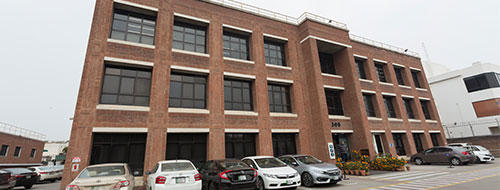One of the greatest challenges of our times is the sustainable management of water. For Pakistan, a country that is one of the top 10 to be affected by climate change impact, this is a special concern. Here, every drop counts, and every effort to save it matters!
As a responsible water steward, Nestlé Pakistan, is focusing majority of its sustainability efforts on protecting, restoring, and renewing water sources. In 2017, we launched our flagship initiative on water stewardship, Caring for Water-Pakistan (C4W-Pakistan), which focuses on three areas: Agriculture, Communities and Factories. In line with the United Nations Sustainable Development Goals, C4W-Pakistan encourages collective action and brings different partners together to discuss and find solutions for the existing water challenges faced by Pakistan.
Taking another step forward, in 2021, Nestlé launched the Waters Pledge to accelerate water stewardship efforts. Under this Pledge, our Waters Business committed to lead the regeneration of the water cycle to help create a positive water impact everywhere it operates by 2025.
As a responsible company, we use our scale, resources, and expertise, to change lives and contribute towards a healthier planet. Through C4W-Pakistan, we positively impact the lives of farmers, people and the communities we work with and in. Find out how we are impacting their lives.
Innovative Irrigation Solutions for Farmers

Agriculture is the most water intense sector in Pakistan, using over 90% of the country’s water resources according to the Food and Agriculture Organization. Of this, over 50% is wasted due to mismanagement including through dependence on flood irrigation. To play its role as a good water steward, Nestlé Pakistan works closely with farmers to promote the use of innovative irrigation solutions for a water-wise world. One of these innovative interventions is the installation of drip irrigation across 139 acres in Punjab, with expansion in Sindh underway.
Mustapha Yousaf, one of the farmers working with Nestlé on drip irrigation owns the Dar-Es-Salaam Farms close to the Nestlé Sheikhupura Factory. His farm is a diversified agriculture enterprise which has been sourcing various ingredients to Nestlé Pakistan since 2016.
“With the support of Nestlé, we have installed drip irrigation on 20 acres. Compared to conventional flood irrigation, drip irrigation allows for over 30-40% savings in water used. Not only this, due to optimum levels of irrigation facilitated by the technology, there has been an increase in yield and decrease in the use of fertilizer,” Mustafa iterates.
Exploring Technological Innovations in Sustainable Water Management with LUMS
Nestlé Pakistan and the Lahore University of Management Sciences (LUMS) are working together to explore technological innovations in sustainable water management. While working closely with Water, Information and Technology (WIT) at LUMS with the Associate Professor and Founding Director WIT LUMS Dr. Abubakr Muhammad, Nestlé has developed low-cost smart soil moisture sensors.

Dr. Muhammad who is passionate about water saving highlights that climate related challenges, including those pertaining to water cannot be fought without innovation. “The example of the reduction of water wastage through the smart moisture sensors has been one major success in introducing innovation to combat these challenges,” he further added.
Currently operational across 548 acres in Punjab, these sensors read the moisture level of the soil and send data updates to the farmer on which areas they should irrigate and how much.
Alliance for Water Stewardship (AWS) Standards at our Factories
Muhammad Arshad, Safety, Health, and Environment (SHE) Manager at Nestlé Sheikhupura Factory co-leads the implementation of the Alliance for Water Stewardship (AWS) Standard at our Sheikhupura Factory. AWS is an international standard for freshwater resources that guides organizations to manage water by taking site and catchment relevant initiatives through stakeholder inclusive processes.
“By employing the Alliance for Water Stewardship Standard, we have been able to understand our water consumption and impacts, and work towards sustainable water management. This has helped improve our in-house efficiency and makes me feel so proud about my work,” notes Arshad.
Nestlé Pakistan’s Sheikhupura Factory became the first site in Pakistan as well as the first Nestlé site worldwide to be awarded the AWS Certification in 2017. Our factories in Islamabad, Kabirwala, and Karachi followed suite and were certified in 2018, 2019, and 2020 respectively.
In addition to our interventions on drip irrigation and smart soil moisture sensors with farmers, we have developed demonstration sites that showcase best farm practices. These serve as lighthouses for practitioners, policymakers, and students. One such site is developed in partnership with the Pakistan Agriculture and Research Council (PARC), while another has been set up in collaboration with the University of Veterinary and Animal Sciences (UVAS), Pattoki.
Cleaning and Safe Drinking Water for Communities
While understanding our own water consumption and its impact is important to us, the communities where we operate are of equal value to us. Therefore, we have developed 6 Clean and Safe Drinking Water Facilities that provide free access to clean drinking water to 60,000 people daily.
Muhammad Ilya, a resident of Bhatti Dhilwan near our Sheikhupura factory is just one of the many beneficiaries of these water facilities. He regularly collects water from our Clean and Safe Drinking Water Facility and his entire family benefits from it.
“My family and friends now have access to safe and clean drinking water. The incidence of disease has gone down in the Bhatti Dhilwan area,” remarks Ilyas.
These are just a few of the beneficiaries of our Caring for Water-Pakistan initiative. We are currently expanding our interventions to realize our Waters Pledge.
In Commitment with



